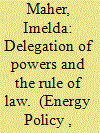| Srl | Item |
| 1 |
ID:
166431


|
|
|
|
|
| Summary/Abstract |
This article examines the legal frameworks surrounding the EU energy policy and its associated institutional architecture. Particular focus is on the Agency for Cooperation of Energy Regulators (ACER). Taking stock of ongoing debates concerning the Energy Union and recently proposed reforms, the purpose of this analysis is twofold. First, from a theoretical perspective, this article explores the limits of the principal/agent model for European integration after the Treaty of Lisbon. It argues that a rule of law analysis should supplement this model in order to improve the encapsulation of the complexities of delegation in policy areas such as energy. Second, this will enable a reflection on the principle of energy justice and the way in which it is articulated by policy and governance changes in the EU.
|
|
|
|
|
|
|
|
|
|
|
|
|
|
|
|
| 2 |
ID:
157881


|
|
|
|
|
| Summary/Abstract |
Member states of the United Nations (UN) agree that its development system needs substantial reform given its fragmentation and outdated structures, as well as new demands from the 2030 Agenda. Yet, a recent two-year reform process yielded no substantial reform decisions. Why did member states fail to endorse the necessary reforms despite almost unanimous recognition of the need for change? This paper describes member states’ conflicting positions on reforming the UN and analyses their failure to delegate authority to the UN development system. North and South, donors and recipients, are locked in a struggle for power and control, maximising bilateral influence at the expense of the benefits of multilateral cooperation. The paper contributes to the pool of UN studies, adding a decidedly political perspective of the reform process. It is based on diplomatic statements, negotiation drafts and interviews with UN diplomats.
|
|
|
|
|
|
|
|
|
|
|
|
|
|
|
|
| 3 |
ID:
166946


|
|
|
|
|
| Summary/Abstract |
The lack of appropriate regulatory frameworks is a main barrier for the expansion of distribution grids. Therefore, we ask whether the amendment of German incentive regulation ordinance will reduce agency costs between distribution system operators and the regulatory authority. To answer this question, we elaborate a theoretical framework based on regarding literature in the fields of (1) principal agency theory and (2) German grid regulation. We then apply this framework to changes in German incentive regulation for distribution grid operators: first, we statistically proof the existence of incentives to shift investments in time under the old German grid regulation; second, we derive that these misleading incentives are erased by its amendment; third, we quantitatively assess the expected effects on distribution grid operators’ investment behavior; and fourth, we conclude that the amendment leads to a diminished dead weight loss. Our results offer a quantitative basis for ongoing political discussions on appropriate regulation schemes. Based on our results, we can draw the conclusions that (1) the amendment of German grid regulation is an appropriate measure to reduce misleading incentives for distribution grid operators and (2) still a dead weight loss exists and other regulation schemes such as Yardstick competition should be considered.
|
|
|
|
|
|
|
|
|
|
|
|
|
|
|
|